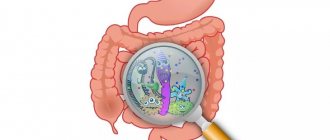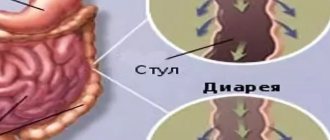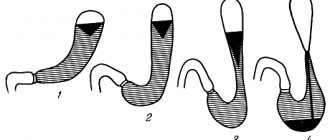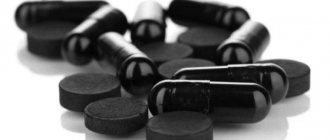A variety of advanced pathologies of the digestive system lead to the stomach not digesting food. This disorder is called dyspepsia. With it, food entering the digestive organ is not processed and not fully absorbed. As a result, the patient’s condition worsens, and unpleasant symptoms such as heaviness, nausea and pain begin to bother. In order for the treatment of the problem to be effective, it is important to find out the causes of dyspepsia and, if possible, eliminate negative factors.
Symptoms of dyspepsia
If the stomach does not cope with its function, the following changes in condition occur:
- There is a constant feeling of fullness.
- Worries about nausea, heartburn, vomiting, belching. Possible “hunger” pains.
- Due to the release of bile after eating, a burning sensation occurs in the chest area.
- Even regardless of food intake, a painful spasm and heaviness appear in the upper abdomen. Discomfort may spread to the spine.
- Due to the fact that food is delayed for digestion for a long period, appetite worsens, and satiety quickly occurs.
The so-called “lazy” stomach is diagnosed mainly in adults. The disease can develop in one of the following ways:
- Ulcerative – a combination of heartburn, night or hunger pain, belching.
- Dyskinetic – discomfort and heaviness are accompanied by a feeling of fullness.
- Nonspecific - a combination of the above types is observed.
Diseases and symptoms associated with poor digestion
Digestive disorders occur more often after eating and are often associated with banal gluttony.
Causes of slow digestion...
But sometimes the same symptoms can be associated with problems of the esophagus, stomach, liver and biliary tract, for example, if in old age digestive disorders half an hour after a meal, “intestinal ischemia” can be suspected.
In contrast, duodenal ulcers produce symptoms immediately during meals, and nausea before meals may indicate hepatobiliary dysfunction. Poor digestion is often associated with eating a large dinner after fasting all day.
Often discomfort occurs regardless of food intake, for example during sleep: in the case of people suffering from reflux disease. In this case, it may be useful to raise the head of the bed by 10 cm.
Below we explain which diseases can cause digestive problems and what symptoms they manifest.
Stomach diseases
| Reflux disease, hiatal hernia | The reason is the rise of stomach contents into the esophagus. This occurs due to decreased tone of the lower esophageal sphincter. | Excess acidity, bitterness in the mouth, halitosis, pain and burning in the stomach area, insomnia, high blood pressure and tachycardia. |
| Ulcer | Caused by the bacterium Helicobacter pylori, which destroys the gastroduodenal mucosa, making the stomach walls susceptible to the action of gastric juice | Heartburn, pain in the upper abdomen. |
Intestinal diseases
| Irritable bowel syndrome (so-called “ulcerative colitis”) | It is believed that the cause of this condition is an imbalance of intestinal flora, but it is not yet clear how this can cause digestive disorders | Bloating, flatulence, diarrhea, side pain |
| Celiac disease | Reduces the absorption function of sugar and nutrients; nutrients are not absorbed, remain in the intestinal lumen, ferment and form gas | Bloating, flatulence, diarrhea |
Diseases of the liver, pancreas and biliary tract
| Hepatitis, liver cirrhosis, pancreatic cancer and pancreatitis | The secretion of digestive enzymes is impaired, the ability of the gastrointestinal tract to digest food is reduced | Nausea, vomiting, heaviness, pain in the upper abdomen |
| Dysfunction of the gallbladder and biliary tract | Prevents the release of bile into the duodenum. Digestion of fats is slower | Biliary colic |
Extraintestinal diseases
Digestive disorders can also be caused by diseases outside the gastrointestinal tract, such as diabetes, thyroid disease, inflammation of the adrenal glands and blood vessels, heart and kidney failure.
In all these cases, intestinal transit slows down and bloating and constipation develop because the action of the autonomic nervous system (the part of the nervous system responsible for intestinal motility) is reduced.
Dyspepsia is a diagnosis of exception
If the symptoms are constant or periodic and persist for at least 3 months, then we can talk about functional dyspepsia. This is a diagnosis of exclusion, that is, it is spoken about when the doctor excludes all other causes of digestive upset .
Symptoms of dyspepsia: feeling of heaviness after eating, nausea, vomiting, frequent belching, drowsiness.
Causes of poor digestion
Gastric dysfunction can be caused by various factors:
- Lack of a balanced diet and proper nutrition.
- Dry snacks, fast food abuse, overeating.
- Constant stress.
- Immunity to certain products.
- The predominance of fatty, spicy, spicy foods in the diet.
- Regular consumption of alcohol, which stimulates the production of hydrochloric acid.
- Hormonal disbalance. The reason that food is not digested in the stomach is a violation of secretory function.
- Late snacks as a result of which the main organ of the gastrointestinal tract does not have time to rest.
A poorly functioning tract may also be a consequence of insufficient metabolism, infection with bacterial flora, or decreased juice concentration. Regardless of the cause, you should not delay treatment for too long. It is important that the problem is solved comprehensively with correction of diet and lifestyle.
Video: About the most important thing: “Offended stomach”
https://youtu.be/qZHuhQh_KNM
Effective remedies for digestive problems
Slow and prolonged digestion of food can be, as we have seen, a consequence of disease of the stomach, intestines or, in some cases, may have an extraintestinal cause, but it can also be a consequence of improper food intake.
The first means of improving digestion is to maintain a healthy eating lifestyle. Eat slowly, chew properly, reduce stress, move more - in most cases, following these recommendations will solve all digestive problems.
You can also add herbs to tea or use chewable tablets to stimulate bowel function and digestion. These drugs are most effective for functional disorders.
If digestive difficulties persist, it is necessary to consult a doctor and do research to find out the causes of intestinal disorders.
What to eat and what foods to avoid - nutrition rules
What to include in your diet to help slow digestion ? In principle, you can eat anything that does not cause bloating and heartburn, the main thing is to make your meals too large and high in protein and lipids.
Other useful tips:
- Eat a balanced diet, with nutrients divided equally between all meals to avoid complicating your digestion.
- When digestive disorders worsen, it may be useful to reduce main meals and introduce two snacks in the middle and afternoon so as to more evenly distribute the load on the gastrointestinal tract.
- Avoid foods that are difficult to digest, such as fried and fatty meats, the types of fish mentioned above, fats that slow down stomach emptying and cause a feeling of heaviness.
- Avoid flour, milk and dairy products if you are intolerant to these products.
- In case of digestive problems due to reflux, it may be useful to exclude garlic, onions, and spicy foods from the diet.
- If you suffer from bloating, avoid cruciferous vegetables.
- Avoid alcohol to speed up stomach emptying and smoking to reduce burning and acidity.
- Maintaining the right weight will reduce pressure on your stomach, especially when you sleep, and can reduce episodes of stomach contents refluxing into the esophagus.
Strategy – food diary
To find out which foods cause digestive problems, you must learn to recognize the signals that our body sends. In this light, it is useful to keep a food diary in the following form:
| Monday | I'm on my way | Time | Digestive disorders |
| Product | breakfast | ||
| Product | snack | ||
| Product | dinner | ||
| Product | snack | ||
| Product | dinner |
By filling out this chart every day for a week, it will be easier for you to understand which foods cause digestive problems, including the timing of their consumption.
Natural remedies – herbal teas and tablets.
To improve digestion, we can use natural herbs in the form of teas or chewable tablets, which should be taken before meals two or three times a day.
Herbs that help us digest food better:
| Yarrow, verbena | Due to antispasmodic properties, they are used to produce essential oils used against gastritis and reflux |
| Anise, cumin | Prevents the formation of gases in the intestines and bloating |
| Chicory | Cleanses the intestines, improves bile production and diuresis |
| Gentian, apple | Stimulates the production of digestive enzymes, improves digestion |
| Licorice | Reduces burning sensation by protecting the stomach walls from the action of gastric juice enzymes |
| Ginger | Promotes digestion, reduces intestinal fermentation and gas formation |
Why does the stomach not digest food?
Belching of rotten eggs, diarrhea and other symptoms of functional dyspepsia develop against the background of impaired motor activity. As a result of the loss of the digestive organ's ability to properly contract, foods are poorly crushed and are retained in the stomach longer.
Normally, the processed mass gradually moves through the gastrointestinal tract towards the colon. When activity decreases, fermentation processes are launched and the composition of the gastric and intestinal flora is disrupted. The consequence of such changes is a deterioration in the general condition.
Absorption process in the intestine
Absorption or absorption is usually understood as the process of transport of valuable substances supplied with food.
The physiology and structure of the gastrointestinal tract ensures that beneficial components enter the blood plasma, lymph, and tissue fluid, which determines the absorption mechanism. The intestines absorb valuable substances and water through the walls, which contain a large number of microvilli. Processed dietary fiber (chyme) enters the small intestine from the duodenum, where it is further broken down. Next, the lump moves into the ileum. More than 20 intestinal enzymes and intestinal epithelial cells help speed up digestion, but the main function of this section of the gastrointestinal tract is absorption, which occurs with varying intensity in individual zones of the intestine. Carbohydrates enter the bloodstream as glucose, and fats are absorbed into the lymph after being converted into fatty acids and glycerol.
The large intestine has low enzymatic activity, but there is a large number of bacteria that contribute to the breakdown of coarse plant fibers, the formation of vitamin K and individual elements of group B. Mostly water is absorbed in the large intestine. Absorption of carbohydrates is partially possible, which is often used in artificial nutrition by enema.
The large and small intestines more actively absorb particles of chyme and water due to their motility. Peristaltic mechanisms ensure the mixing of food mass with digestive juices and the movement of the pulp through the intestine. Due to the increase in intraintestinal pressure, individual components are absorbed from a specific intestinal cavity into the blood and lymph. Motility is provided by longitudinal and circular muscles, their contractions regulate types of intestinal movements - segmentation and peristalsis.
Reasons for violation
In most cases, the malabsorption mechanism is triggered by concomitant diseases of the gastrointestinal tract, regular consumption of unhealthy food and contaminated water. Cases of impaired absorption have been recorded due to medical intervention in the functioning of the digestive system - drug or surgical treatment. Other, no less significant, provocateurs of the development of the syndrome of difficult absorption in the intestine are:
The causes of malabsorption in the intestine are problems in neighboring organs of the gastrointestinal tract, poor nutrition or the environment.
- infectious diseases, against the background of which the number of pathogenic microbes in the intestinal tract increases, causing enteritis, Whipple's disease or Crohn's disease;
- immune disorders, when the body begins to suppress itself, as well as diseases of the lymphatic system, leading to the spread of pathogens within the gastrointestinal tract (gluten-induced or exudative-hypoproteinemic enteropathy);
- parasitic infestations, for example, tapeworms;
- cardiac and vascular pathologies;
- diabetes;
- intestinal amyloidosis, carcinoid syndrome (caused by the release of hormones by cancerous tumors into the bloodstream).
Return to contents
How to help your stomach digest food
In order for food to begin to be processed in full again, you need to approach the problem responsibly (do not ignore the doctor’s recommendations). A set of all therapeutic measures is planned based on the collected medical history and research results. In some cases, the first step is fasting, then a medication regimen is prescribed.
Medicines
Different groups of drugs are indicated for the treatment of indigestion:
- To eliminate diarrhea and cramps in the intestines, sorbents are used that envelop the mucous membrane of antacids. Almagel, Enterosgel, Smecta are recommended. They are also indicated when the cause of dyspepsia is poisoning.
- To ensure that the stomach can effectively digest food , fermented medications are used: Imodium, Linex, Mezim, Creon.
- If the main symptom of dyspepsia is unbearable heartburn, you need to take acid-reducing drugs Gastracid, Gaviscon. Maalox, Ranitidine, Flemoxin also work well.
- To relieve pain and restore muscle tone, use the drugs Spazmalgon and Drotaverine.
What to do?
In the case where the disruption of the stomach has caused the presence of another disease (viral type, peptic ulcer, acute or chronic gastritis, etc.), it is necessary to treat the second disease, and at the same time get rid of the symptoms of the first. Treatment of a stomach in which food is poorly digested is prescribed by taking medications of various effects. Diarrhea can be treated with anti-diarrhea medications, and constipation can be treated with laxatives. Elevated temperature is reduced by antipyretics.
Medicines
The doctor prescribes medications to eliminate the symptoms of the disease, these include:
- enzyme enzymes that promote better functioning of the stomach - “Creon”, “Gastenorm Forte”;
- painkillers that help eliminate stomach pain and normal functioning - “Drotaverin”, “Spazmalgon”;
- Antihistamines that help reduce high stomach acidity - Clemaxin, Ranitidine.
If therapy is needed for a child, other, more gentle drugs are prescribed.
Treatment with folk remedies
When treating, you can use the root, seeds and juice of celery.
Dyspepsia can be successfully treated for children and adults using folk remedies and recipes. Examples of popular recipes:
- Celery. Take 1 tsp. ground celery root, pour 1 liter of hot water and leave for 8 hours. Next, filter and drink 2 tbsp. l. during the day. If there is no root, then you can use and make an infusion from celery seeds and juice, the effect will be the same. A child will like celery juice as a medicine.
- Dill. The plant is endowed with a variety of beneficial properties that are too long to list. The most significant ones are the ability to improve digestion in children and adults, eliminate bloating and constipation, and have a diuretic effect. To prepare the decoction, take 1 tsp. dill seeds and pour boiling water, then strain and drink a sip throughout the day.
- Collecting medicinal herbs can help normalize metabolism in the body in both children and adults. Take honey, aloe and red wine. Honey and wine 600 grams each, aloe - 300 grams. Grind aloe, add honey and wine. Mix the ingredients and take 1 tsp. on an empty stomach.
In old age, there is a need for enemas, since with age the metabolism becomes slower, not like in a child, so the digestive organs wear out, frequent constipation occurs, pain and cramps appear in the stomach, and intestinal clogging occurs. It is necessary to force an elderly patient to do an enema at least once a week. Before the procedure, drink a glass of infused wormwood herb, which will have a beneficial effect on the digestion process.
Nutrition correction
With the help of a diet, you can alleviate and improve the condition of an adult and a child, especially during the period of taking medications. It is important to avoid fatty, fried, smoked, spicy, and salty foods. This also includes fast food dishes (hot dogs, pizza, hamburgers, etc.), as they contain a large amount of unhealthy fats. If you approach dietary nutrition with a positive attitude, your appetite will improve and, accordingly, the production of gastric juice will improve. This is why it is necessary to eat in a quiet, peaceful environment, so that no external stimuli distract you from such an important activity.
It is important to pay attention to the daily menu. It is recommended to choose good quality products, without harmful ingredients such as dyes and preservatives, so as not to burden the stomach. The compatibility of products is important, that is, you should not eat meat and apples at the same time, since meat is digested poorly and takes a long time, and apples quickly. An online food compatibility table will help. If you follow the recommendations, things will soon improve.
Regarding hot drinks, such as coffee or tea, which people are used to drinking immediately after eating, doctors are categorical - this is not recommended. Drinking hot drinks is allowed only an hour after or before meals. These are the rules you must follow for a speedy recovery in order to maintain the health of yourself and your child.
Prevention
Preventing dyspepsia is much easier than curing the disorder. For the proper functioning of the stomach and intestines, a number of principles are followed:
- The diet is carefully controlled, excluding heavy, fatty, spice-rich foods.
- They plan to lose weight or cleanse the body without using too strict diets.
- Draw up nutritional plans with the correct ratio of fats, proteins, carbohydrates.
- Include fruits and vegetables in the menu as priority products.
- Food is minimally salted.
- They reconsider their life position, excluding an acute reaction to stress and troubles.
- The functioning of the main systems and organs is regularly checked - they undergo preventive examinations once a year.
- If possible, give up bad habits, including smoking, drinking alcohol, cooking from processed foods, and overeating.
Preventive measures also include limiting caffeine consumption and avoiding late evening and night snacks. Neglecting breakfast also has a negative impact on the body’s condition.
Diagnostics
If symptoms progress and there is a clear deterioration in stomach function, you must make an appointment with a gastroenterologist. It is this doctor who treats diseases associated with the digestive system. After an initial examination, palpation, and history taking, the doctor will give a referral for clinical blood and urine tests, which will show the overall picture of a person’s health condition, and will also make it possible to identify hidden inflammatory processes. The doctor will also advise you to do a stool test, in which, in case of indigestion, the remains of undigested food will be visible. Instrumental techniques will help confirm the diagnosis:
- radiography with contrast;
- electrogastroenterography;
- Ultrasound of the stomach and abdominal organs;
- MRI or CT.
Possible complications
If dyspepsia is not treated or is delayed for a long period, constant food retention in the gastrointestinal tract results in serious gastropathologies. In this case, the gallbladder, pancreas, and liver become involved in the process. We are talking about colitis, pancreatitis and a number of other diseases that require long-term therapy.
When the approach to the treatment of “lazy” stomach syndrome is comprehensive, peristalsis is quickly restored, stool is normalized, spasms and general weakness are eliminated. It is important that recovery occurs under the supervision of a doctor, who will promptly adjust the dose of medications and determine the duration of the course. Learn how to increase hemoglobin in the blood at home using the link.
( 5 ratings, average: 5.00 out of 5)
How to normalize the condition?
If your stomach regularly hurts after eating, you must adhere to the following recommendations:
- eat small portions;
limit the consumption of fatty, heavy, spicy foods;
have dinner three hours before bedtime;
Drink fluids between meals.
Food for stomach pain should not be too cold or hot. Products should be eaten boiled or baked.
If the stomach does not accept food at all, and vomiting immediately begins after eating, then this most likely indicates an ulcer. In this case, you must immediately go to the hospital.
Gastroparesis (impaired passage of food through the stomach) description
Gastroparesis is a clinical syndrome that is characterized by impaired passage of food through the stomach due to a decrease in the contractile activity of the muscular wall of the organ. The disease is characterized by the appearance of unpleasant sensations after eating, a feeling of rapid satiety, nausea, and repeated vomiting.
Gastroparesis is a clinical syndrome characterized by impaired passage of food through the stomach.
The diagnosis of gastroparesis is made on the basis of clinical manifestations and data from specific studies (radiography, FGDS, electrogastrography, scintigraphy, breathing test). Treatment includes a proper diet, the prescription of prokinetics, antiemetics, and psychotropic substances. In severe forms, electrical stimulation of the stomach and surgical methods are used.
Complications of the disease are explained by prolonged residence of food in the stomach cavity. Due to the fact that digestive products are not evacuated into the intestines for a long time, the undigested mass may harden. A dense lump is formed from it - a bezoar.
As it moves through the digestive tract, it blocks the lumen of the intestinal loops, which can cause intestinal obstruction. Stagnation of food helps create an environment favorable for the growth of bacteria. The active spread of pathogenic microflora can lead to an inflammatory process in the mucous membrane, which underlies the development of gastritis.
The prognosis of the disease in the early stages is favorable. Gastroparesis can be corrected with medication. When it is carried out, the pathological symptoms disappear. Late detection of the disease can worsen the prognosis for the patient. An advanced course requires more radical treatment measures. Complications may occur after surgery.
Treatment of the syndrome and how to improve absorption
The decision on treatment algorithms is made by a gastroenterologist based on the diagnostic data obtained, the identified causes of the pathology and the degree of severity. Treatment is complex using different techniques. Success largely depends on the correctness of the selected diet. To do this, the doctor recommends those products that do not cause a negative response from the gastrointestinal tract.
The dietary table is constantly adjusted in order to provide the body with all the necessary minerals and vitamins. For example, if lactose is difficult to absorb, dairy products are prohibited. When the intestine does not absorb gluten well, patients refuse foods enriched with gluten protein (products made from wheat or rye flour, oatmeal, barley). For diarrhea, a diet with foods that can retain stool is recommended.
Types of syndromes
There are 2 main groups of pathologies:
- problems associated with a decrease in the production of pancreatic enzymes into the small intestinal lumen;
- disorders accompanied by a decrease in the level of bile acids in the gastrointestinal tract.
Within each group there are the following clinical signs:
- gastric;
- intestinal;
- hepatic;
- pancreatic.
Characteristic symptoms of the disorder
The clinical picture of impaired absorption in the intestine is bright and pronounced:
Failure of absorption in the intestines provokes diarrhea, weakness, heaviness, flatulence, and weight loss.
- Severe and profuse diarrhea, frequent bowel movements. There is mucus in the stool, and its smell is foul.
- Excessive gas production.
- Constant discomfort, heaviness, even cramps in the abdomen. Symptoms intensify as soon as food enters the gastrointestinal tract.
- Fatigue.
- Visual exhaustion due to sudden weight loss.
- Paleness, “dark circles” under the eyes.
- Anemic signs.
- Night blindness (develops when the intestines do not absorb vitamins well).
- Hypersensitivity of the skin to any damage: instant bruising. This indicates a lack of vitamin K.
- Brittle nails, hair, nagging pain in bones, muscles and joints due to calcium deficiency.
Return to contents
Diagnosis of food absorption in the intestine
If several characteristic symptoms of malabsorption syndrome appear, it is recommended to consult a gastroenterologist. Based on the assessment of complaints, external examination and palpation, the doctor will prescribe a list of necessary tests and instrumental studies.
Today the most popular diagnostic procedures are:
- ”
- Lab tests:
- biofluids (blood, urine) - to assess the general condition of the body and determine signs of problems with hematopoiesis;
- feces - to calculate the degree of fat breakdown;
- smear - to identify pathogenic microflora in the intestines;
- exhaled air samples - in order to detect Helicobacter pylori infection, difficulties with digesting lactose, and counting the approximate number of beneficial bacteria in the intestines.
- Hardware and instrumental research:
- endoscopy with biopsy of intestinal tissue - a probe technique for visual inspection of the lumen, mucous membranes and walls of the gastrointestinal tract up to the small intestinal section;
- X-ray of the intestines with contrast - to assess the condition of the intestines;
- Rectoscopy is a visual examination of the condition of the mucous membrane and tissues in the large intestine.
Return to contents
Treatment
Treatment of FD includes general measures to change the rhythm of the patient’s life: normalization of diet and daily routine, maximum elimination of bad habits and stress factors, adjustment of medications.
Patients are prescribed a diet that involves limited consumption of spicy and fatty foods. It is recommended to eat small portions, but often, up to 6 times a day.
Drugs that can treat functional dyspepsia include prokinetics (stimulants of gastrointestinal motility), enzyme preparations (synthetic analogues of natural gastric enzymes), antisecretory drugs (inhibiting the secretion of gastric glands). The use of medications is permissible only after consulting a doctor, making a diagnosis and determining the dosage.
The success of FD treatment depends on the general condition of the patient, timely examination and compliance with all doctor’s recommendations.
For fans of traditional medicine, there are many recipes for treating functional dyspepsia. Medicines that can be prepared at home include, for example, dill infusion. 1 teaspoon of dill seeds is poured into 200 ml of boiling water and left for 20 minutes. You need to take 30 ml of this product immediately after meals. But what you need to do first is to contact a therapist or gastroenterologist.
Often people who experience symptoms of FD try not to pay attention to them and rarely come to the doctor. They consider these phenomena to be temporary and insignificant, attributing discomfort in the stomach to fatigue and one-time excesses in nutrition. The causes of unpleasant sensations may be much deeper factors that require immediate consultation with a doctor. A person may try to drown out the unpleasant sensations with painkillers, which absolutely should not be done all the time. In such cases, it is necessary to undergo examination by a gastroenterologist, who will prescribe adequate treatment.











